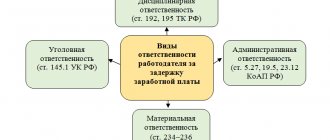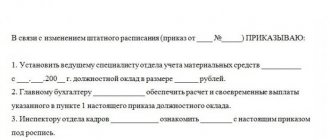Employees are not always guided by the principle - “debt is good enough” and are in no hurry to pay off their debts. We are talking about tax debts, alimony, accounts payable to banks, housing departments and other creditors. It happens that the employer himself provides the employee with a loan, but in the event of dismissal, the employee does not think about paying off the debt, because “you take someone else’s money for a while, but you give yours away forever!”
Foreclosure of wages
Not only does the employee collect his wage debts from the employer, but in certain situations the employer is also forced to foreclose on the debtor’s wages.
When does this happen and on the basis of what document?
Foreclosure of wages is carried out on the basis of a decision of the bailiff and a copy of the writ of execution.
There is a certain procedure for collecting debt from the income of the debtor employee and certain deadlines when the decision must be executed by the employer.
What should the employee expect next?
If all the requirements for the application for the issuance of a court order were met by the employee, then after 5 days a copy of it will be sent to the employer (Article 126 of the Code of Civil Procedure of the Russian Federation).
But not everything is so smooth for the employee.
Important! The employer has the right to file his objections to the court order within 10 days.
And in this case, the order is canceled and the employee will have to file a lawsuit in court in the general manner (Article 129 of the Code of Civil Procedure of the Russian Federation). Copies of the court ruling to cancel the court order are sent to the employer and employee no later than three days after the day it was issued.
If no objections are received from the employer, a court order is issued to the employee. And then the employee has the right to present it to the bailiffs for execution, or directly to the bank in which the debtor-employer has a current account.
If the organization fails to comply with the court order within the period established for voluntary execution, the employer will also pay an enforcement fee. Such a fee is set at 7% of the wages subject to collection, but not less than 5 thousand rubles from the debtor company.
Resolution on recovery of wages
The order of the bailiffs received by the company of the debtor employee is registered in the company and on the same day a notification is sent to the bailiff service that the order has been received.
What should you pay attention to when receiving a resolution?
The resolution must contain a set of mandatory details.
Among them: full name of the debtor, date, name of the bailiff service, full name and position of the bailiff who initiated the decision, details of enforcement proceedings, grounds for the decision to withhold (Article 17 of the Federal Law of October 2, 2007 No. 229-FZ) .
After checking the resolution on a formal basis, the company’s accountant should decide on the list of income from which deduction will be made.
This is not difficult to do, since accruals in favor of the employee are recorded by type (code) of income. And the accounting program correlates the type of income with the list of payments that have executive immunity.
The debtor’s right to use a salary card within the framework of enforcement proceedings
Law No. 229 “On Enforcement Proceedings” clearly defines the rights and obligations of the bailiff, banking organization and debtor.
So, for example, Article 70 of Federal Law No. 229 literally provides the following:
- The bailiff is obliged to seize funds stored in the bank in the name of the debtor, with the exception of those types of income that cannot be foreclosed on (Article 101 of the Federal Law No. 229).
- The debtor is obliged to submit to the bailiff documents confirming that certain funds in his accounts cannot be foreclosed on.
- The banking organization that services the debtor's accounts is obliged to calculate the amount of funds to be collected, taking into account the requirements of Articles 99 and 101 of Federal Law No. 229.
In practice, the debtor faces difficulties for which he was not prepared. For example, the debtor does not immediately understand where he needs to go and what document to demand. Many debtors run to the bank to find out the reason for blocking the card, begin to quarrel with bank employees and shout that they have violated their rights. From there they are sent to the bailiff.
In the bailiff department, the debtor does not know which door to go through and which bailiff to contact. Stands in long lines and is endlessly nervous. The senseless rushing from the bank to the bailiff department can last more than one day, but time passes, and the debtor needs money every day. All this is extremely unpleasant and has a bad effect on the debtor’s health.
ATTENTION! Our specialists will help you avoid unnecessary fuss and hassle if you call them at the phone numbers listed on our website.
What payments cannot be recovered?
For example, the following payments are immune (Article 101 of Law No. 229-FZ):
- for compensation for harm caused to health, as well as for the loss of a breadwinner;
- for injuries received in the performance of official duties;
- compensatory nature to citizens who suffered due to radiation or man-made disasters;
In this case, the source of payment must be funds from the federal, local budgets, as well as the budgets of the constituent entities of the Russian Federation.
- various compensations according to labor legislation.
For example, compensation for travel expenses, as well as in connection with the transfer of an employee to another location, the birth of a child, marriage, or death of close relatives.
It is impossible to foreclose on child benefits paid to the debtor at the expense of funds from all levels of budgets, as well as extra-budgetary funds.
Maternity capital funds are also protected from collection.
The new “Putin” payment for children in the amount of 10,000 rubles also has immunity from foreclosure.
Important! The list of types of wages and other income for alimony deductions was approved by Decree of the Government of the Russian Federation of July 18, 1996 No. 841.
Labor inspection inspections: how they will be carried out in 2020
New Administrative Regulations on Federal State Supervision of Compliance with Labor Laws, approved. by order of Rostrud dated June 13, 2019 No. 160, came into force on October 22, 2019.
Supervision of compliance with labor legislation is carried out by Rostrud through, in particular, scheduled and unscheduled inspections of employers. As part of such inspections, labor inspectors check the completeness and timeliness of payment of wages, the correctness of calculations for dismissal and payment of vacation pay, compliance with labor protection requirements, etc. (clause 5 of the Regulations).
The new Regulations are brought into compliance with the requirements of labor legislation and other regulations (taking into account recent changes made to them) governing the implementation of federal state supervision over compliance with labor legislation.
How an inspector will check salary indexation
The new regulations established an exhaustive list of documents and (or) information that a labor inspector may request during an inspection.
In particular, the State Tax Inspectorate can request and check documents on the employer’s indexation of workers’ wages (clause 13 of the Regulations).
In addition, the employer may be required to provide documents confirming compliance with mandatory requirements in the field of protecting personal data of employees, pay slips and orders for approval of their forms, documents confirming compliance with mandatory labor protection requirements and ensuring safe working conditions.
What determines the timing of a labor inspection inspection?
According to the new regulations, verification of the employer cannot exceed 20 working days.
A scheduled on-site inspection of a small business entity cannot exceed 50 hours, and in relation to a micro-enterprise - 15 hours during the year, unless otherwise provided by law.
If an employer operates on the territory of several constituent entities of the Russian Federation, the total period of inspection in relation to it cannot exceed 60 days (clause 24 of the Regulations).
Grounds for terminating a labor inspection
The new regulations expand the list of grounds under which an inspection cannot be started, and an already started inspection must be terminated. Such grounds are (clause 27 of the Regulations):
- lack of grounds for an inspection;
- inconsistency of the subject of inspection with the powers of Rostrud and its territorial bodies;
- gross violations during the organization and conduct of inspections provided for by the legislation on state control (supervision);
- a situation where the inspection contradicts other requirements of federal laws, regulatory legal acts of the President of the Russian Federation or the Government of the Russian Federation;
- identification, after the start of an appropriate verification, of the anonymity of the appeal or statement that was the reason for its organization, or the establishment of knowingly unreliable information contained in the appeal or application.
Application of a risk-based approach to inspections
Following the example of inspections carried out in other areas (for example, during inspections of compliance with fire safety requirements), government inspectors will use a risk-based approach when inspecting employers.
This means that each employer (legal entity and individual entrepreneur) will be assigned to a separate risk category, which determines the frequency and thoroughness of the inspection - see the table.
Table
| No. | Risk category to which the employer is assigned | Carrying out an inspection |
| 1 | High risk | Once every 2 years |
| 2 | Significant risk | Once every 3 years |
| 3 | Medium risk | Once every 5 years |
| 4 | Moderate risk | Once every 6 years |
Risk categories are assigned by Rostrud taking into account departmental reports on injuries and wage arrears from a particular employer, as well as through a system of interdepartmental interaction with the Federal Tax Service of Russia.
If there is no information about the employer’s classification as a risk category, it is considered that it is classified as a low risk category and routine inspections are not carried out in relation to it. At the same time, the possibility of unscheduled inspections remains available.
Checks must be carried out using checklists
The order or order to conduct a scheduled inspection will indicate the details of the checklist that will be used during the inspection. The subject of the check will be limited to the list of questions included in such a checklist (clause 51 of the Regulations). The form of the checklist was approved by order of Rostrud dated November 10, 2017 No. 655. Such a checklist is drawn up by the inspector before the start of the inspection.
Restrictions on the amount of deductions
Having decided on the list of “allowed” income, the accountant must take into account the limitation on the amount of all deductions from the salary and other income of the debtor.
Thus, as a general rule, the total amount of all deductions when paying wages cannot be more than 20%, and in some cases - 50% (Article 138 of the Labor Code of the Russian Federation).
What if several decisions are made against one debtor employee?
In any case, the employee must retain half of the salary.
But there is an exception to this rule (clause 3 of Article 138 of the Labor Code of the Russian Federation). For example, the rule does not apply when collecting alimony for minor children or in cases of compensation for damage due to the loss of a breadwinner.
In such situations, the withholding limit cannot be more than 70%.
How long can holds be made?
Until the decree is fully implemented.
What to do if your salary card is blocked by bailiffs
When a debtor is faced with the fact that all the funds placed on his salary card have become inaccessible to him in full, he has a question: how to prove to the bailiffs that the card is a salary card?
In fact, there is nothing complicated about it. To do this you need:
- Contact the accounting department of your company with a request to be issued a certificate for bailiffs that the card is a salary card. You can read the application for the employer to obtain a certificate from the bailiffs about the salary card (sample) below.
What does an application to the accounting department for a certificate look like?
What does a certificate for bailiffs obtained from the accounting department look like? - Get a certificate stating that the card is a salary card. We present the document “Certificate for bailiffs about a salary card” (sample).
- Submit a written statement to the bailiff department stating that the funds received on the card (indicate the salary card number) are wages.
This application must be supported by a certificate for bailiffs about the salary card issued by the employer.
The application to the bailiffs is submitted in free form. A sample application to the bailiff department is presented below.
ATTENTION! The application to the bailiffs, as well as the certificate attached to it, oblige the bailiff to cancel his previous decision to seize the debtor’s funds.
What does an application to bailiffs for a refund look like?
Next, the bailiff issues a new order to seize the debtor’s funds, indicating the new amount to be written off to pay off the debt.
This order of the bailiff must begin to be executed by the bank immediately, that is, within the first working day from the date on which it was received by the bank.
If you encounter difficulties in obtaining a certificate from your place of work, or when writing an application to the bailiffs, contact the lawyers at the phone numbers that you see on the website.
If income is not enough to enforce the decision
The salary is not always enough to fulfill the writ of execution. When a person’s income is too low, the bailiff has the right to begin searching for other property and rights, including:
- real estate, both residential and non-residential;
- movable property, including transport, equipment and so on. An FSSP employee can send a request to the traffic police to obtain information about the availability of vehicles;
- some rights, for example, a share in an LLC. The right to a share in the organization can be exercised;
- share in the right to jointly acquired property. However, the allocation of such a share requires a court decision. Both the claimant himself and the FSSP specialist have the right to go to court;
- other objects and rights that are valuable and can be implemented for the purpose of executing a court decision.
The bailiff must use all possible sources of funds, from the most obvious to the less significant.









